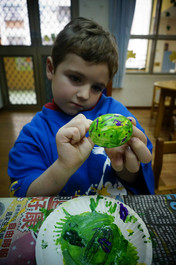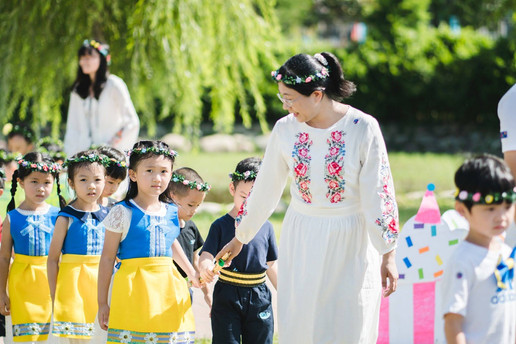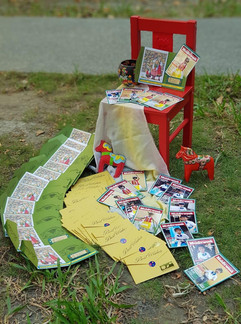建立文化與理解的橋樑:蒙特梭利節慶課程
- 凱祥 黃
- 2024年12月4日
- 讀畢需時 8 分鐘

Building Bridges of Culture and Understanding: A Journey Through Montessori Education 在種籽蒙特梭利幼兒園,我們始終相信,每位孩子的成長都是一段不可替代的旅程,每一份用心都會在孩子心中留下深刻的印記。在教育的探索過程中,我們發現,文化教育不僅僅是傳授知識,更是一種深層次的引導,讓孩子在了解自己的同時,也能尊重和欣賞世界的多樣性。而這一切,都始於我們對蒙特梭利教育的堅持與實踐。
回顧創園初期,我們面臨的不僅是幼兒園的建立,更是如何為孩子們創造一個真正能落實蒙特梭利理念的學習環境。最初,我們對於文化教育與語言教育的理解並不深刻。雖然,得到許多教育前輩專家的指導與協助,以及有經驗的蒙特梭利教師,但在是語言還是文化的實務能力都相對薄弱。因此,我們不得不借助坊間教材來做為文化課程的主題。但是,我們意識到,這些資源雖然解決了部分問題,但也讓課程的主軸偏離了蒙特梭利文化教育的核心理念。同時,主題教材包含了課程設計、進度和評量,沒有做好教師的養成和對於孩子發展的認識,會讓教師對完善的教材產生依賴,很容易遺忘對孩子發展、觀察和引導。
隨著種籽課程的逐步發展,我們開始思考,如何讓文化教育真正融入蒙特梭利的體系。這不僅僅是對課程的完善,更是對孩子教育的一份承諾。於是,在 Akyer Amelita蒞園擔任顧問後,她的到來為我們注入了全新的視角與專業指導。她在教室內的親自示範成為教師的榜樣與模範,建立種籽的師徒制度,同時也協助教師在培訓、評量、親師會談系統的建立等做出多方面的貢獻,幫助種籽一步步的邁向蒙特梭利教育理念的實踐。同時,在她指導與協助協助下,籽製作了許多語言和文化領域的教具,讓文化教育的框架逐漸成形,真正融入教學。
在這樣的基礎上,我們開始思考,如何將文化教育的內容與幼兒的生活經驗相連結,讓孩子們能在探索中發現自我,並建立對世界的好奇心與尊重。於是,在經過多次開會研討後,種籽決定以世界節慶作為主題,將文化教育做為整體的課程規劃的主軸。這對種籽來說是一個全新的挑戰,因為文化領域涵蓋了動物、植物、地理、歷史、天文、科學等多方面的知識,而這些內容需要以三年為一個循環進行規劃。同時,在混齡的環境下實施小組教學,也需要在課程設計、時間安排和教學實施上付出更多心力。
在顧問的建議下,我們著手建立以世界七大洲為核心的節慶文化課程。每一學期,我們根據不同的文化背景,設計課程內容、製作相關教具,並將音樂、故事、地理、歷史和藝術活動融為一體,讓孩子能夠在多感官的體驗中,深入了解不同國家的文化與價值觀。例如,在探索非洲的收穫祭時,我們將蒙特梭利文化領域「動物、植物、地理、歷史、天文科學」等,以非洲為主題來呈現,帶領孩子們感受到非洲文化的魅力。不同的學期,我們深入研究不同的主題,探究台灣主題時,我們辦理了台灣的謝冬活動,邀請布袋戲來園演出;進入歐洲課程時,我們和孩子一起認識愛爾蘭的聖派翠克節、種籽20週年慶的瑞典的仲夏節;北美洲的加拿大楓糖節、美國佛羅里達草莓節;南美洲的巴西嘉年華、聖母聖潔日;非洲的埃及聞風節;亞洲的韓國面具節、泰國水燈節;大洋洲的夏威夷花環節......每一個學期環繞著不同主題,這些都是種籽曾經辦過的世界節慶與課程主題,讓孩子們通過實地體驗和參與活動,了解多元文化的深度與廣度。
這些年的努力,讓我們對於文化節慶教育有了更深的理解。它不僅幫助孩子建立對多元文化的尊重與理解,也讓我們的教師團隊在規劃與執行課程的過程中,不斷成長與突破。隨著科技的進步,我們學會運用新工具來收集資訊,提升教學效率,也逐漸累積了更多系統化的經驗。
此外,我們還發現,文化節慶教育並不是單純的知識傳遞,而是將學科知識與文化背景相結合,幫助孩子建立跨文化的理解與尊重。例如,透過探索世界各地的音樂、舞蹈和藝術,孩子能體驗到不同文化的多樣性;通過參與節慶活動,他們能了解每個文化背後的故事與價值觀。在這樣的過程中,孩子不僅學會了尊重他人,也更加了解自己的文化身份。
即使在疫情期間,我們面臨了全新的挑戰。許多實體活動無法進行,但我們透過錄影、直播和創意形式,將節慶活動延續下去。例如,在非洲主題的學期中,我們透過線上方式展示收穫祭,讓孩子依然能感受到這種傳統的溫度與意義。隨後的幾年中,我們持續克服困難,探索更多元的文化課程,例如韓國文化主題和戶外劇場形式的客家粄圓節活動。
在文化節慶課程的發展中,我們感受到每一次挑戰的背後,都是一次珍貴的學習機會。我們的教師團隊不僅在課程規劃中不斷精進,也逐步提升了跨學科整合的能力,讓每一個文化主題都能更豐富、更深入地呈現給孩子們。透過這些努力,我們不僅見證了孩子們的成長,也看到了文化教育對於他們世界觀的塑造。
我們深知,教育從來不是一件容易的事,但所有的用心與堅持,都會在孩子的成長中發揮無限的價值。在種籽,我們不僅希望孩子了解文化的多樣性,更希望他們能在這些經歷中學會尊重與包容,成為擁有全球視野的下一代。我們相信,每一份付出都是為了看見孩子的微笑,而這些微笑,就是我們教育旅程中最珍貴的回報。
通過這些年來對文化教育的探索與實踐,我們更加堅信,文化節慶教育是一條值得投入的道路。它不僅讓孩子們了解世界,更讓他們學會如何在多元的文化環境中,找到自己的定位,並與他人和諧相處。在未來的日子裡,我們將繼續致力於文化教育的深化,讓更多孩子能在愛與理解中茁壯成長,成為世界的光與希望。
Building Bridges of Culture and Understanding: A Journey Through Montessori Education
At Seed Montessori Preschool, we have always believed that every child's growth journey is unique and irreplaceable, and every ounce of care we pour into their education leaves a lasting mark on their hearts. Through our exploration of education, we discovered that cultural education is not merely about imparting knowledge; it is a profound guidance that helps children understand themselves while appreciating and respecting the diversity of the world. All of this is rooted in our steadfast commitment to Montessori education and its principles.
The Early Challenges of Cultural and Language Education
Looking back to the early days of our school, we faced challenges far beyond simply establishing a preschool. We were tasked with creating a learning environment that genuinely embodied Montessori's principles. Initially, our understanding of cultural and language education was limited. Although we received guidance and assistance from experienced Montessori educators and experts, we recognized gaps in practical applications related to both language and cultural education. To fill these gaps, we relied on commercial teaching materials for cultural courses. While these resources temporarily addressed some issues, we realized they diverted our curriculum away from the core philosophy of Montessori cultural education. Over-reliance on pre-structured materials also risked overlooking the importance of understanding child development and the necessity of teacher growth.
Laying the Foundation for a Cultural Education Framework
As the preschool gradually developed, we began to deeply reflect on how to truly integrate cultural education into the Montessori framework. This was not merely about enhancing the curriculum but a promise to the children we serve. The arrival of Akyer Amelita as our advisor provided us with a fresh perspective and professional guidance. Her classroom demonstrations set an example for teachers and established a mentoring system at Seed Montessori. She also made significant contributions to teacher training, evaluation processes, and the parent-teacher conference system. Additionally, she assisted in the creation of various language and cultural teaching materials, enabling the cultural education framework to take shape and become an integral part of our teaching practices.
Integrating Life Experiences with Cultural Education
Building on this foundation, we sought ways to connect cultural education with children's daily experiences, allowing them to discover themselves through exploration and foster curiosity and respect for the world. After numerous meetings and discussions, we decided to center our curriculum on global festivals, integrating cultural education as the main theme of our academic planning. This marked a new challenge for Seed Montessori, as cultural education encompasses knowledge across animals, plants, geography, history, astronomy, and science, all requiring a structured three-year cycle. Moreover, implementing small group teaching in a mixed-age environment required meticulous planning and greater effort in lesson design, time allocation, and teaching execution.
Developing a Global Festivals Curriculum
Guided by our advisor's suggestions, we began building a curriculum around the cultural festivals of the seven continents. Each semester, we crafted lesson content based on different cultural backgrounds, created teaching materials, and integrated music, stories, geography, history, and art into a cohesive learning experience. For instance, during our African Harvest Festival theme, we used Montessori cultural areas like animals, plants, geography, history, and astronomy to present the subject, helping children experience the richness of African culture. Over the years, we explored other themes such as Taiwan's Winter Solstice celebration with traditional puppetry performances, Ireland's St. Patrick's Day, Sweden's Midsummer Festival, Canada's Maple Syrup Festival, Brazil's Carnival, Egypt's Wind Festival, Korea's Mask Festival, Thailand's Loi Krathong, and Hawaii's Lei Festival. Each semester revolves around a unique theme, providing children with opportunities to experience and participate in activities that deepen their understanding of diverse cultures.
The Transformative Impact of Cultural Festival Education
These efforts over the years have deepened our understanding of cultural festival education. It not only fosters respect and understanding for diverse cultures among children but also helps our teaching team grow and innovate in curriculum planning and implementation. With advancements in technology, we have learned to use new tools to gather information, enhance teaching efficiency, and build a more systematic approach to our work.
Adapting to Challenges During the Pandemic
Even during the pandemic, we faced unprecedented challenges. Many in-person activities were canceled, but we adapted through recordings, live broadcasts, and creative methods to continue our festival events. For example, during an African-themed semester, we used online platforms to present the Harvest Festival, ensuring children could still experience the warmth and meaning of this tradition. Over subsequent years, we overcame difficulties to explore broader cultural themes, such as Korean culture and Hakka Rice Ball Festivals in outdoor theater formats.
Fostering Respect and Understanding Through Culture
Cultural festival education's essence lies not just in knowledge transfer but in integrating academic learning with cultural contexts to help children build cross-cultural understanding and respect. Exploring global music, dance, and art, children experience the richness of cultural diversity. Participating in festival activities, they learn the stories and values behind each culture, gaining both self-awareness and appreciation for others.
Looking Ahead: Continuing the Journey
Through years of exploration and practice in cultural education, we are more convinced than ever that cultural festival education is a path worth pursuing. It not only broadens children's understanding of the world but also helps them find their place within diverse cultural environments and learn to live harmoniously with others. In the years ahead, we will continue to deepen our commitment to cultural education, helping more children thrive in love and understanding and become beacons of hope for the world.
員林種籽 種籽蒙特梭利幼兒園






























































































留言